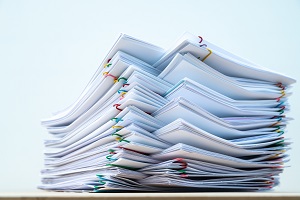HOA record keeping is more than just filing documents into a folder and stuffing them in a desk drawer to gather dust. It requires meticulous organization and an intricate system to carry out correctly. Unfortunately, not all HOAs have a good method for keeping records.
HOA Record Keeping Done Right
Sorting through a stack of miscellaneous receipts, contracts, and other documents can be tedious at best. Having no organizational system in place to make that search any easier is inconvenient. Ideally, every HOA board should analyze their current record-keeping habits and consider ways to improve them. Otherwise, board members will spend more time looking for a document than fulfilling their responsibilities.
Color-coding and labeling are all well and good, but many other aspects should be taken into account. Here are eight tips for superior HOA record keeping.
Create a System for Record Keeping for HOA
Record keeping relies on a reliable organizational system, but that’s a blanket solution. To truly create a system that works for your association, you need to address your association’s specific needs. That means answering a few questions first.
1. What Is Considered a Record?
 Is every document that gets written considered a record? Or is it the only documents that get discussed during meetings?
Is every document that gets written considered a record? Or is it the only documents that get discussed during meetings?
Board members need to contemplate what they should refer to as a “record” and what is simply a passing memo. Typically, if something were discussed during a meeting, it would be considered a record.
In cases where separate documents refer to the same thing, you might only consider one as a record worth keeping.
For example, there are two documents referring to an ice cream party the board held at their last meeting: a flyer that was posted around the neighborhood and a receipt from the vendor. You might then consider the receipt a more formal record of the event versus the flyer.
2. What Records Should You Keep?
Of course, some records are automatically considered essential and, therefore, must be filed. These include financial records, insurance records, and legal records. Any warranties and contracts should go into the system as well. If you have an architectural policy, ensure those records make it into filing, too. Additionally, a copy of all meeting minutes must be kept. You don’t have to keep multiple copies; one should suffice.
3. Where Will You Keep the Records?
 A physical record keeping system for HOAs — that is, one that exists in the real world — is considerably outdated. Yet, some associations find that they do the majority of their storage in filing cabinets.
A physical record keeping system for HOAs — that is, one that exists in the real world — is considerably outdated. Yet, some associations find that they do the majority of their storage in filing cabinets.
The digital age has allowed many associations to store their records in online databases. This also makes for easier access and distribution. However, some physical documents will still need to be kept regardless of a digital system.
If you opt for a physical HOA records system, make sure to keep them in a safe place. Usually, that means setting aside a storage closet for all your records. Other than being secure, the area must be dry and fireproof.
4. How Should You Keep Records?
When it comes to the storage of HOA records, go for boxes that are consistent in size. It is also a good idea to number these boxes so you can store them in order. Apart from that, ensure a community archive for HOA docs. Create a list of the HOA documents you have in storage and which box number you will find them in. That way, you can refer to the list when looking for a particular record without having to sift through all the boxes.
5. Who Has Permission to Access the Records?
 Some documents should be for the eyes of board members only, while others should be made available to homeowners. That means you must determine which documents are which and then figure out how to restrict or give access to the right people.
Some documents should be for the eyes of board members only, while others should be made available to homeowners. That means you must determine which documents are which and then figure out how to restrict or give access to the right people.
Having a sound system in place will also allow for faster recovery times when a homeowner requests a document. Assign a homeowners record keeper among the board to stay on top of all documents. Delegating the task of producing records to a single person could be efficient by eliminating confusion.
6. What About Third Parties?
Many associations utilize the expertise and resources of a remote management company. Such a company will handle many of an association’s back-office, collection, and financial services. These duties will require access to the record-keeping system. The BOD should consider any third-party companies so that its system can run efficiently.
7. How Long Should You Keep Records?
 One question that often pops into the minds of HOA board members is, “How long should financial records be kept?” Just as not every document should be considered a record, not every record will need to be kept for the same duration.
One question that often pops into the minds of HOA board members is, “How long should financial records be kept?” Just as not every document should be considered a record, not every record will need to be kept for the same duration.
Each record has a shelf-life; some may need to be kept for as long as the association exists. Records higher up the document hierarchy will likely need to be stored much longer than those at a lower tier. Board members can check with their local governing authorities to determine which relevant records must be kept and for how long. For instance, the IRS requires organizations to keep tax returns for at least three years.
Other records not regulated by a higher authority might have to be retained for up to 10 years or more, depending on your association’s bylaws. Even if the length of retention for certain records isn’t clearly stated in the bylaws, the board members will still need to determine it.
Legal records, meeting minutes, bylaws, CC&Rs, and other essential records should most likely be kept indefinitely. Warranties, for instance, may only need to be kept for the duration of the warranty. The same rule applies to various contracts and policies. On the other hand, meeting agendas and monthly financial statements may require just one year of storage.
8. How Should You Dispose of Records?
What happens when you no longer need to hold on to a record? Should you shred it? Burn it? Whatever your method of destroying irrelevant records, the board should be unanimous. More importantly, they should all follow through with it. When you keep no longer relevant records, you will end up with a cluttered storage cabinet.
Just as a method of organization is imperative to HOA record keeping, so is a method of destruction. A good rule of thumb is to collect all outdated records at the end of the year. Revise your list to include the date you destroyed the record. Then, sort out your documents once again.
Stay on Top of Your HOA Records
HOA record keeping is an essential association function and ensures operating efficiency. You can often resolve problems by referring to records. But, if these records don’t exist or were prematurely destroyed, it can lead to an even bigger mess. If you don’t want to lose important documents, creating an organized filing system is a surefire way.
Running an HOA is tough, so most boards outsource various services to remote HOA management companies. If you wish to do the same, don’t hesitate to call us at 865.315.7505 or contact us online.
RELATED ARTICLES:
- HOA Financial Reports: What Every HOA Board Member Should Know
- HOA Bank Statements: Everything You Should Know About It
- What Is The HOA Governing Document Hierarchy?

